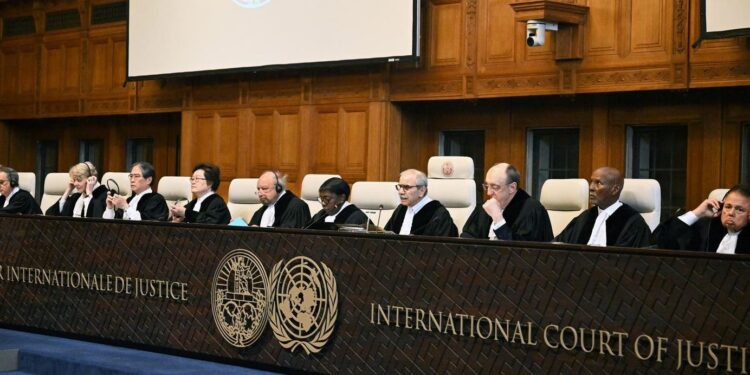THE HAGUE, NETHERLANDS – APRIL 09: A general view of the hall at the International Court of Justice … [+] (ICJ) in The Hague, the Netherlands on April 09, 2024. (Photo by Dursun Aydemir/Anadolu via Getty Images)
Anadolu via Getty Images
On October 15, the Registrar of the International Court of Justice announced the schedule for the oral arguments in its opinion on climate change. The hearings will begin on Monday, December 2, with over 100 countries and organizations presenting over 12 days. At the request of the United Nations General Assembly, the ICJ will determine the existing financial liability of countries for their contribution to climate change. The advisory opinion on the Obligations of States in respect of Climate Change, while non-binding, will impact how countries develop sustainability and climate change related laws moving forward.
On March 29, 2023, the UNGA asked the ICJ to issue an advisory opinion on the legal obligations of countries in preventing climate change. The opinion, while non-binding, will give an indicator of how the Court may interpret future climate related litigation and guide future legislative development.
The UNGA asked a two questions:
“What are the obligations of States under international law to ensure the protection of the climate system and other parts of the environment from anthropogenic emissions of greenhouse gases for States and for present and future generations”?
“What are the legal consequences under these obligations for States where they, by their acts and omissions, have caused significant harm to the climate system and other parts of the environment, with respect to: (i) States, including, in particular, small island developing States, which due to their geographical circumstances and level of development, are injured or specially affected by or are particularly vulnerable to the adverse effects of climate change? (ii) Peoples and individuals of the present and future generations affected by the adverse effects of climate change?”
The UN sent an initial package of relevant laws and treaties. The Court determined that members states and international organizations should also given the opportunity to weigh in on their legal arguments and opinions through written statements. The initial written statements were due on March 22, 2024.
In April, the Court announced they had received a record high 91 written statements from member states and international organizations. Those parties had until August 15 to file written responses. On August 16, the Court stated it had received 62 responses by the deadline.
The August press release also set December 2 as the start date for public hearings. The hearings will occur at the International Court of Justice in The Hague, Netherlands. On October 15, parties participating in oral arguments were sent a schedule.
Eighty-eight will be from country delegations, including a joint statement from five Nordic countries, and the remaining 12 will be from organizations. Of the 91 written statements (listed below), all but five will participate in oral arguments. Those not participating are the Democratic Republic of the Condo, Madagascar, Argentina, Indonesia, and the Parties of the Nauru Agreement Office.
An additional 14 countries and one organization that did not file written statements will participate in the oral arguments. Those parties are Cote d’lvoire, Dominica, Fiji, Guatemala, Jamaica, Malawi, Maldives, Myanmar, the Pacific Community, Palestine, Panama, Senegal, Sudan, Syria, and Zambia.
Notably, Vanuatu, the main advocate for the UNGA requesting the opinion from the ICJ, will present oral arguments on December 12. For now, the ICJ has not released the written statements or responses. It is anticipated they will be released when oral arguments begin.
Given the complexity of the case, it is most likely that the Court will not issue its opinion until the end of 2025.
The written statements filed by member states (in order of receipt by the Court): Portugal; the Democratic Republic of the Congo; Colombia; Palau; Tonga; Singapore; Peru; Solomon Islands; Canada; the Cook Islands; Seychelles; Kenya; Denmark, Finland, Iceland, Norway and Sweden (jointly); the Philippines; Albania; Vanuatu; the Federated States of Micronesia; Saudi Arabia; Sierra Leone; Switzerland; Liechtenstein; Grenada; Saint Lucia; Saint Vincent and the Grenadines; Belize; the United Kingdom of Great Britain and Northern Ireland; the Kingdom of the Netherlands; the Bahamas; the United Arab Emirates; the Marshall Islands; France; New Zealand; Slovenia; Kiribati; China; Timor-Leste; the Republic of Korea; India; Japan; Samoa; the Islamic Republic of Iran; Latvia; Mexico; South Africa; Ecuador; Cameroon; Spain; Barbados; Sri Lanka; Madagascar; Uruguay; Egypt; Chile; Namibia; Tuvalu; Romania; the United States of America; Bangladesh; Kuwait; Argentina; Mauritius; Nauru; Costa Rica; Indonesia; Pakistan; the Russian Federation; Antigua and Barbuda; El Salvador; the Plurinational State of Bolivia; Australia; Brazil; Viet Nam; the Dominican Republic; Ghana; Thailand; Germany; Nepal; Burkuna Faso; and The Gambia.
Source link : http://www.bing.com/news/apiclick.aspx?ref=FexRss&aid=&tid=6717c88a6b33449ca29891158e8ff8f4&url=https%3A%2F%2Fwww.forbes.com%2Fsites%2Fjonmcgowan%2F2024%2F10%2F22%2F88-countries-will-present-oral-arguments-in-international-courts-climate-change-opinion%2F&c=6658313011243948162&mkt=en-us
Author :
Publish date : 2024-10-22 01:30:00
Copyright for syndicated content belongs to the linked Source.




